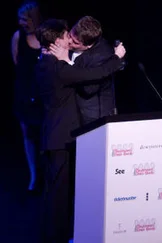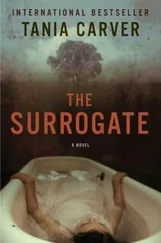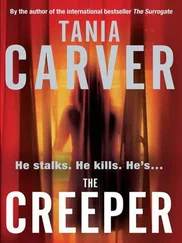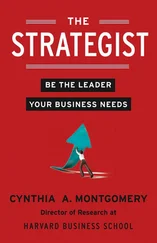1 out of 7 Core BUs collected. 0 of 8 Core Skills collected.
 The next BU we stumbled upon in our research on what makes great managers different is a behavior that is so subtle we nearly missed it. We even doubted its significance until we realized it had also been identified as one of the most important BUs for a wide range of professionals, including physicians, psychologists, salespeople, consultants, lawyers, pilots, and hostage negotiators. This powerhouse BU goes by many names. At LifeLabs Learning, we call it the “ Playback.”
The next BU we stumbled upon in our research on what makes great managers different is a behavior that is so subtle we nearly missed it. We even doubted its significance until we realized it had also been identified as one of the most important BUs for a wide range of professionals, including physicians, psychologists, salespeople, consultants, lawyers, pilots, and hostage negotiators. This powerhouse BU goes by many names. At LifeLabs Learning, we call it the “ Playback.”
A Playbackis a paraphrase of what you heard someone say. Why does it help you become a great manager faster? Take a look at the following conversation. We're now a few weeks into Mia's role as a manager, and Olivia is starting to open up about her challenges at work. Notice where Playbackscould have made it a better conversation:
| Olivia: |
Ugh. I'm avoiding my to-do list, and I'm not looking forward to our team project. |
| Mia: |
What do you think is going on? |
| Olivia: |
I don't know. I'm just kind of exhausted by everything lately. |
| Mia: |
Is it that you don't take breaks? |
| Olivia: |
I do, but I'm still tired. |
| Mia: |
When was the last time you took some time off to recharge? |
| Olivia: |
Well, I could use my vacation days, but then I'll be even more behind. |
| Mia: |
When would be better timing? |
| Olivia: |
I guess I could already set aside time in December when it's slower. |
 At first Mia is proud that she got to practice her question skills, but something felt off. She decides to hit her handy Do-Over Button to go back and Playback:
At first Mia is proud that she got to practice her question skills, but something felt off. She decides to hit her handy Do-Over Button to go back and Playback:
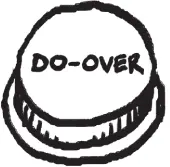
| Olivia: |
Ugh. I'm avoiding my to-do list, and I'm not looking forward to our team project. |
| Mia: |
Hmm. Sounds like two things are on your mind: your to-do list and the project. Right? Of those two, which is the bigger issue? |
| Olivia: |
That's right …. I guess the project is the bigger problem. It's really weighing on me because everyone is waiting for me to get it started. |
| Mia: |
It's feeling like a lot of responsibility. |
| Olivia: |
Right. I like having responsibility, but I don't want to let the team down. |
| Mia: |
Okay, so it sounds like you want to be more confident about how to start. |
| Olivia: |
Yeah. If the project starts well, the rest will probably go smoothly. |
In both versions, Mia has good intentions. But while taking breaks and vacation days are lovely things to do (and we highly recommend them), this advice does little to solve the underlying problem that Olivia faces: figuring how to start that project. So, what is it about Playbacksthat makes them so useful?
Playbacks Help Managers Make a Positive Impact Faster in Three Ways
1. Playbacks Create Clarity Faster
 When someone comes to you with a problem, their thoughts are often a tangled web. This is especially the case when they are tinged with strong emotions. Using a Playbackis a quick way to ensure you understand their problem. What's more, when people hear their words played back to them, it helps them simplify the complexity of their thoughts. Research has long shown that the mere act of talking out loud leads to faster problem-solving (Gagné and Smith Jr. 1962; Lupyan and Swingley 2011). Why? It's likely thanks to a neuropsychology hack called “spreading activation”: as we start talking, our thoughts spread to different associations, drawing on more of our neural resources faster. Yes, fellow introverts, this even applies to us.
When someone comes to you with a problem, their thoughts are often a tangled web. This is especially the case when they are tinged with strong emotions. Using a Playbackis a quick way to ensure you understand their problem. What's more, when people hear their words played back to them, it helps them simplify the complexity of their thoughts. Research has long shown that the mere act of talking out loud leads to faster problem-solving (Gagné and Smith Jr. 1962; Lupyan and Swingley 2011). Why? It's likely thanks to a neuropsychology hack called “spreading activation”: as we start talking, our thoughts spread to different associations, drawing on more of our neural resources faster. Yes, fellow introverts, this even applies to us.
2. Playbacks Catch Misunderstandings Faster
Playbacksare also an efficient way to prevent misunderstandings. Hear an incorrect Playback? This is your chance to fix it before it becomes a problem. As a chilling example: a manager we interviewed told us about a $500,000 loss her company sustained within 24 hours because no one confirmed their understanding of the plan. One person assumed it was obvious they had to submit signed paperwork to their client, while the rest of the team assumed a verbal agreement was sufficient. (In case you're wondering, the paperwork was not optional.) “When I worked in carpentry, we always said, ‘Measure twice, cut once,’” the manager told us. “After seeing a bunch of people almost lose their jobs over a miscommunication, I'll never forget that Playbacksare my ‘measure twice’ mechanism.”
3. Playbacks Build Trust Faster
 Playbacksprovide instant confirmation of understanding. For us humans, being truly understood is one of the sweetest (and sadly, also rarest) psychological sensations. Understanding leads to faster trust-building, which results in people being more willing to share their thoughts and feelings with each other.
Playbacksprovide instant confirmation of understanding. For us humans, being truly understood is one of the sweetest (and sadly, also rarest) psychological sensations. Understanding leads to faster trust-building, which results in people being more willing to share their thoughts and feelings with each other.
If the benefits of Playbackssound soft and/or squishy, think of the hours of your life you've already lost to rambling conversations, unproductive conflict, team members avoiding tough conversations, and plain old misunderstandings. Life is too short to go another day without Playbacks. (Yep, that's how passionate we are about this BU.) So, how do you do a Playback? Here are a few different Playbacktypes to try out:
| PLAYBACK TYPES |
| Content Playback |
Play back the key information you heard. Example: It sounds like you said _____. Did I get that right? |
| Split-track |
Play back and separate points when speakers bring up multiple topics. Example: I think I heard two things: _____ and _____. Is that right? Which of those should we talk about first? |
| Feelings Playback |
Play back the feelings you sense the speaker is experiencing. Example: Sounds like you're feeling _____ . (excited, energized, motivated, hopeful, proud, connected, unsure, hurt, angry, left out, disappointed, sad, worried, insecure, stuck) |
| Needs Playback |
Play back the underlying need the speaker seems to have. Example: So, it seems like what you're needing is more _____ . (reassurance, connection, clarity, meaning, security, respect, recognition, trust, understanding, spontaneity, growth, freedom) |
| Playback pull |
Ask someone to play back what you said to ensure understanding. Example: I know I just said a lot. Would you mind playing back what we discussed to make sure we're seeing it the same way? |
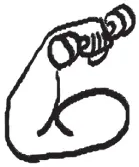 Читать дальше
Читать дальше
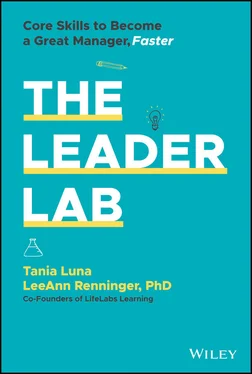
 The next BU we stumbled upon in our research on what makes great managers different is a behavior that is so subtle we nearly missed it. We even doubted its significance until we realized it had also been identified as one of the most important BUs for a wide range of professionals, including physicians, psychologists, salespeople, consultants, lawyers, pilots, and hostage negotiators. This powerhouse BU goes by many names. At LifeLabs Learning, we call it the “ Playback.”
The next BU we stumbled upon in our research on what makes great managers different is a behavior that is so subtle we nearly missed it. We even doubted its significance until we realized it had also been identified as one of the most important BUs for a wide range of professionals, including physicians, psychologists, salespeople, consultants, lawyers, pilots, and hostage negotiators. This powerhouse BU goes by many names. At LifeLabs Learning, we call it the “ Playback.”




